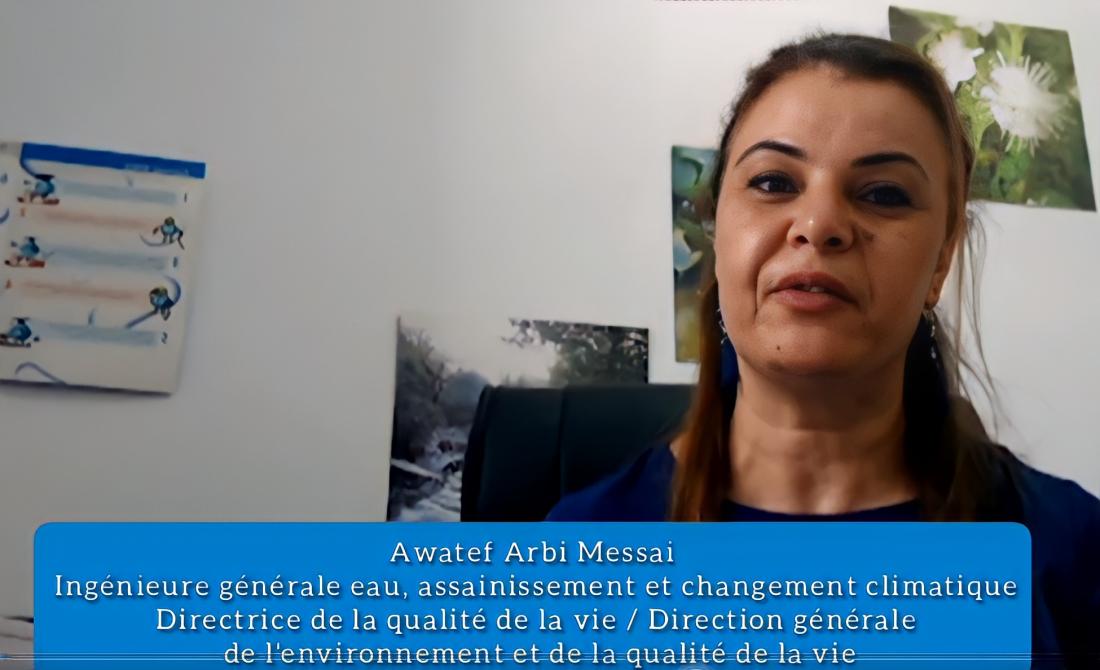NAWAMED Project: Interview of Tunisian stakeholder about Nature-Based- Solutions and main limitations for the reuse of Non-Conventional Water Resources

In the frame of the NAWAMED project "Nature Based Solutions for Domestic Water Reuse in Mediterranean Countries", the Centre for Water Research and Technologies (CERTE, Tunisia), leader of the WP4 “Training and capacity building on Sustainable domestic Water Management” conducted a survey among socio-economic partners to identify potential limitations to the implementation of Nature Based Solutions (NBS) for the reuse of non-conventional water (NCW) in Tunisia.
Mrs. Awatef Arbi Messai, General Engineer in hydraulics, water, Sanitation and climate change, Director of quality of life in the General Directorate of Environment and Quality of Life (DGEQV) at the Ministry of Environment, testified on this subject. She has led several strategic studies (Profitability of Treated Wastewater Reuse, Feasibility study for the transfer of treated wastewater, Technical, environmental and economic feasibility study of the artificial recharge of groundwater tables and others) as well as projects on water, sanitation, climate change and waste.
According to Mrs. Arbi Messai, the reuse of treated wastewater (TWW) is subject to different barriers: economic barriers, restrictive lists of reuse, social barriers, psychological barriers as a reluctance of farmers in relation to the quality of TWW and its daily use.
To counteract these limitations, it is necessary to have a good quality of TWW, to implement transparency and better communication about the water quality provided to the users, to valorise the irrigated cultures with possibilities of marketing and to be able to provide adapted quality for each reuse.
The TWW have the advantage of being regular throughout the year compared to rainwater, and their valorisation reduces the residual environmental impacts related to the discharges into the various receiving environments. According to Mrs. Arbi Messai, there are 122 wastewater treatment plants in Tunisia, with a total capacity equivalent to a large dam of 274 Million of m3, without being affected by climate change. TWW can be used for agricultural, ecological, recreational (green spaces and golf courses), industrial, and groundwater recharge purposes.
To the question what are the most interested actors on the use of NBS for water treatment, Mrs. Arbi Messai replied in the first place the National Sanitation Office (ONAS) which is the producer of municipal TWW and the DGEQV, a highly influential player, working on the quantification of the ecosystem services and the Ministry of Agriculture.
In conclusion, Mrs. Arbi Messai underlined the role assigned to main public actors acting in the field of TWW reuse: the Ministry of Environment through ONAS which is the producer of treated wastewater, the DGQV has strategic role, the National Agency for the Protection of the Environment (ANPE) for the control of wastewater discharge and assess the environmental impact studies, the Ministry of Agriculture for the implementation of TWW irrigated perimeters, and the Ministry of Health for the control of the TWW quality and irrigated perimeters.
Follow the interview of Mrs. Arbi Messai here









